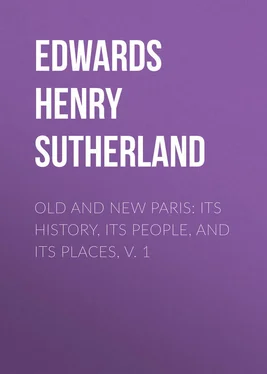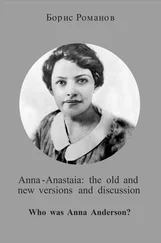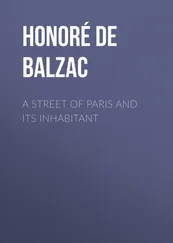Henry Edwards - Old and New Paris - Its History, Its People, and Its Places, v. 1
Здесь есть возможность читать онлайн «Henry Edwards - Old and New Paris - Its History, Its People, and Its Places, v. 1» — ознакомительный отрывок электронной книги совершенно бесплатно, а после прочтения отрывка купить полную версию. В некоторых случаях можно слушать аудио, скачать через торрент в формате fb2 и присутствует краткое содержание. Жанр: foreign_antique, foreign_prose, Путешествия и география, на английском языке. Описание произведения, (предисловие) а так же отзывы посетителей доступны на портале библиотеки ЛибКат.
- Название:Old and New Paris: Its History, Its People, and Its Places, v. 1
- Автор:
- Жанр:
- Год:неизвестен
- ISBN:нет данных
- Рейтинг книги:4 / 5. Голосов: 1
-
Избранное:Добавить в избранное
- Отзывы:
-
Ваша оценка:
- 80
- 1
- 2
- 3
- 4
- 5
Old and New Paris: Its History, Its People, and Its Places, v. 1: краткое содержание, описание и аннотация
Предлагаем к чтению аннотацию, описание, краткое содержание или предисловие (зависит от того, что написал сам автор книги «Old and New Paris: Its History, Its People, and Its Places, v. 1»). Если вы не нашли необходимую информацию о книге — напишите в комментариях, мы постараемся отыскать её.
Old and New Paris: Its History, Its People, and Its Places, v. 1 — читать онлайн ознакомительный отрывок
Ниже представлен текст книги, разбитый по страницам. Система сохранения места последней прочитанной страницы, позволяет с удобством читать онлайн бесплатно книгу «Old and New Paris: Its History, Its People, and Its Places, v. 1», без необходимости каждый раз заново искать на чём Вы остановились. Поставьте закладку, и сможете в любой момент перейти на страницу, на которой закончили чтение.
Интервал:
Закладка:
Princess Charlotte died at Paris in 1841; and quite recently a note on the subject of her last wishes appeared in the Paris Intermédiaire , the French equivalent of our Notes and Queries . It was as follows: – “After the death of the Princess Charlotte, there was found among her papers a sealed packet, of which the superscription directed that it should be opened by the President of the Tribunal – at that time M. de Balli. This magistrate opened the packet and examined its contents. He found the whole correspondence of Bonaparte’s victim with ‘his friend,’ as the worthy magistrate put it: avec son amie . The president gave the packet to the family notary after re-closing it, saying that the letters were very touching, very interesting, but that they must be burnt; which was in fact done.”
The marriage of the Duke d’Enghien to the Princess de Rohan had been informal; the informality consisting solely in its having been celebrated without some necessary sanction: probably that of the king, Louis XVI. The ceremony was performed by Cardinal de Rohan, the bride’s uncle; and it is evident from her first letters that she was regarded by her nearest friends and relatives as the duke’s lawful wife.
Let us now, passing from political to private executions, say a few words about some of the famous duels of which Vincennes, or rather the wood of Vincennes, has from time to time been the scene.
Duels in France are generally fought with swords; and as it depends upon the combatants to strike or not to strike at a mortal part, a hostile meeting is by no means always attended with serious consequences. It is a mistake, however, to assume, as Englishmen frequently do, that a duel in France fought for grave reasons is not itself a grave affair. Plenty of sword duels have placed the worsted combatant in imminent danger of his life; though it is undeniable that the pistol, being a more hazardous weapon, proves, as a rule, deadlier than the sword. When M. Paolo Fiorentino, blackballed at the Society of Men of Letters, on the ground that he had accepted bribes, undertook to fight every member of the association, beginning with M. Amédée Achard, whose name, thanks to its two A’s, headed the alphabetical list, the Italian critic and bravo ran his first opponent through the body, and all but killed him. M. Henri de Pène received like treatment at the hands of an officer by reason of his having described the unseemly conduct of officers generally, as shown at a ball of which the École Militaire was the scene. Both Achard and Pène, however, recovered. Not so the unfortunate Armand Carrel, one of the boldest and most brilliant writers that the Republican Press of France possessed. Armand Carrel and his antagonist, Émile de Girardin, another famous journalist of Louis Philippe’s reign, fought with pistols in that Bois de Vincennes whose name at once suggests crossed rapiers or whizzing bullets.
M. de Girardin was the inventor of the cheap press, not only in France, but in Europe. To reduce the price of the newspaper, and thus increase the number of subscribers, while covering any possible loss on the sale by the enlarged revenue from advertisements, which would flow in more and more rapidly as the circulation widened: such was Girardin’s plan. According, however, to his enemies, he proposed to “enlarge the portion hitherto allotted in newspapers to mendacious announcements to the self-commendations of quackery and imposture, at the sacrifice of space which should be devoted to philosophy, history, literature, the arts, and whatever else elevates or delights the mind of man.”
The proposed change was really one which Democrats and Republicans should have hailed with delight; for it promised to extend a knowledge of public affairs to readers who had hitherto been prevented from becoming acquainted with them by the high price of the newspapers, which, apart from their own articles on political affairs, published long accounts of the debates in the Chamber.
M. de Girardin, however, found his innovation attacked as the device of a charlatan. He was accused of converting journalism into the most sordid of trades: of making it “a speaking-trumpet of the money-grabber and the speculator.” Some of M. de Girardin’s opponents went so far as to hint that he was not working in good faith, and that the losses to which the diminution of price must expose his journal were to be made good by a secret subsidy. Armand Carrel, as editor of the National , entered into the quarrel, and took part against Girardin, who, on his side, wrote a bitter attack upon Carrel. No sooner had Carrel read the scathing article than he called upon its author, demanding either retractation or personal satisfaction. He entered Girardin’s room, accompanied by M. Adolphe Thibaudeau, holding open in his hand the journal which contained the offensive lines. Girardin asked Carrel to wait until he also could have a friend present. M. Lautour-Mézeray was sent for; but pending that gentleman’s arrival some sharp words were interchanged.
Armand Carrel conceived that he was justified in regarding the course adopted by M. de Girardin as indicating an intention to bring the matter to a duel, and on his suggesting as much, M. de Girardin replied, “A duel with such a man as you, sir, would be quite a bonne fortune .” “Sir,” replied Carrel, “I can never regard a duel as a bonne fortune .” A few moments afterwards M. Lautour-Mézeray arrived. His presence served to give the discussion a more conciliatory tone, and it was ultimately agreed that a few words of explanation should be published in both journals. On M. de Girardin’s proposing to draw up the note at once, “You may rely upon me, sir,” said Armand Carrel, with dignity. The quarrel seemed almost at an end; but an incident reanimated it. M. de Girardin required that the publication of the note should take place simultaneously in the two journals. Carrel, on the contrary, held that it ought to appear first in the Presse , Girardin’s paper; but he experienced on this point the most determined resistance. It was then that, carried away with indignation, wounded to the quick, utterly unable to adhere any longer to the moderation which, by a determined effort, he had hitherto enforced upon himself, Carrel rose and exclaimed, “I am the offended person; I choose the pistol!”
It was early on the morning of Friday, July 22, 1836, that Armand Carrel and M. de Girardin found themselves face to face in the Bois de Vincennes.
While the pistols were being loaded, Carrel said to M. de Girardin, “Should chance be against me and you should afterwards write my life, you will, in all honour, adhere strictly and simply to the facts?” “Rest assured,” replied his adversary. The seconds had measured a distance of forty paces; the combatants were to advance within twenty of each other. Armand Carrel immediately took his place and advanced, presenting, despite the urgent entreaties of M. Ambert that he would show less front, the whole breadth of his person to his adversary’s aim. M. de Girardin having also advanced some paces, both parties fired nearly at the same instant, and both fell wounded, the one in the leg, the other in the groin.
“I saw him,” wrote Louis Blanc some time afterwards, “as he lay; his pale features expressing passion in repose. His attitude was firm, inflexible, martial, like that of a soldier who slumbers on the eve of battle.”
M. de Girardin was profoundly grieved at the result of the duel, and he made a vow never to fight again. Many years afterwards, under the Republic of 1848, he visited the grave of the man he had killed, to express his regret and ask for pardon in the name of the form of Government to which he had now become a convert, and which Carrel had always placed above every other.
Читать дальшеИнтервал:
Закладка:
Похожие книги на «Old and New Paris: Its History, Its People, and Its Places, v. 1»
Представляем Вашему вниманию похожие книги на «Old and New Paris: Its History, Its People, and Its Places, v. 1» списком для выбора. Мы отобрали схожую по названию и смыслу литературу в надежде предоставить читателям больше вариантов отыскать новые, интересные, ещё непрочитанные произведения.
Обсуждение, отзывы о книге «Old and New Paris: Its History, Its People, and Its Places, v. 1» и просто собственные мнения читателей. Оставьте ваши комментарии, напишите, что Вы думаете о произведении, его смысле или главных героях. Укажите что конкретно понравилось, а что нет, и почему Вы так считаете.












